Dear Airlines: Why Am I Being Punished for Being Vegan?
An Appeal to Airlines That Think Plant-Based Passengers Lack Standards—or Taste Buds
Thank you for subscribing! I would be so grateful if you would hit the ❤️ at the top or bottom of this post, share, and comment. It lets me know you’re there and helps other people find Compassion in Action! 🙏 HAPPY READING!
Plant-based food is everywhere now—for vegans and non-vegans alike, in restaurants, cafés, and fast food chains—everywhere, it seems, except on airplanes. While the rest of the cabin dines on thoughtfully prepared meals—albeit made with animal products—passengers who choose the plant-based option are often left with bland, uninspired, inedible dishes that feel like an afterthought. Or a punishment. In my open letter to airlines, I share a few of the more absurd experiences I’ve had—and offer a better path forward for airlines that want to improve.
All of the articles in my travel series can be found here.
When I became vegan in 1999, the world was a very different place. Whenever I traveled, I packed a carry-on full of food—just in case. Usually peanut butter and jelly sandwiches for me and my husband, dried fruit, nuts, cut-up carrots, maybe an apple or a banana.
I didn’t pack all of my own food because I was picky; I did it because I didn’t want to go hungry. Airports, airplanes, and restaurants often offered very little for us to eat.
Fast forward to 2025: the world has changed. Awareness has grown. Plant-based meals are everywhere—from Michelin-starred restaurants to fast food chains. But, somehow… airlines haven’t gotten the memo.
Because travel is part of my work (I host all-inclusive trips around the world, run by the amazing World Vegan Travel) and because my husband has mastered the art of travel hacking (strategically collecting and using credit card points and airline miles), we’re fortunate to travel internationally in business class—paying in points rather than dollars.
And while that means a vegan meal is always available, it doesn’t always mean it’s edible.
AIRLINE FOOD: THE GOOD
To be fair, some airlines are better than others. Asian airlines tend to have a longer tradition of meatless meals and know how to make food flavorful without relying on animal products.
Take Cathay Pacific, Singapore Airlines, and ANA (All Nippon Airways). They consistently offer decent plant-based meals, often featuring tofu, mushrooms, greens, and noodles—ingredients rooted in their culinary traditions, where plant-forward dishes aren’t an afterthought, but the norm.
But one Asian airline stands out above the rest: Japan Airlines (JAL). Serving Japan, Asia, North America, and Europe, JAL is hands down the best when it comes to flavorful, thoughtfully prepared plant-based meals—especially from their à la carte menu, which is available to everyone in business class and can be ordered anytime during the flight.
Among the highlights is a Vegetable Curry clearly marked “free of animal products,” and their Special Tonkotsu-flavored Miso Ramen, Kyushu Jangara–style. It’s a plant-based version of the iconic Japanese ramen—no animal ingredients—and inspired by our favorite ramen spot in Tokyo: Kyushu Jangara in Akasaka (see my Vegan Guide to Ramen in Japan). It’s not exactly the same, of course, but it’s surprisingly delicious—and far better than the vegan options offered as special meals. (Just be sure to request it early. It’s available to everyone, not just those who pre-ordered a vegan meal, and it can run out fast.)
As for the aforementioned special meals, here are the three options for vegans:
👉🏿 Vegetarian Vegan Meal (VGML): entirely free of animal products
👉🏿 Vegetarian Raw Meal (RVML): a raw meal of mostly fruits and vegetables
👉🏿 Vegetarian Oriental Meal (VOML): plant-based with “Chinese-style flavors,” and no dairy, eggs, or other animal-derived ingredients
On our last JAL flight, I ordered the VGML meal, and my husband got the VOML meal—which was the clear winner.
TIP FROM THE HIP: Whatever airline you’re flying on the way home from Japan, do yourself a favor and grab a pack of vegan instant ramen from T’s TanTan. You can find it at Tokyo Station, and it’s perfect for plane travel—all you need is hot water. (I also talk about T’s TanTan in Vegan Guide to Ramen in Japan, but here’s a photo reference for their instant ramen.)
Psssst…We have limited spots available for our upcoming 2026 trips to Japan.
AIRLINE FOOD: THE BAD AND THE UGLY
And then there are Western airlines. Their plant-based offerings for vegans? Arbitrary at best, offensive at worst. It seems to depend on the route, the crew, and possibly the phase of the moon.
We’ve all had our share of terrible airline meals, and to be fair, every airline has been guilty of serving inedible fare. But let me share a recent experience on British Airways (BA) that just might top them all.
When David booked our flight from San Francisco to Paris on BA to host our Paris-to-Dordogne trip, we figured we’d be fine. British Airways often serves Indian-inspired dishes to vegetarians, a holdover from the U.K.’s colonial history. We thought: “At least we’ll get rice and curried veggies.”
Instead, I received a tray of something so inedible, even the airline attendant warned me before she served it to me. We had just eaten the starter, which was pretty uninspired but at least palatable (some kind of potato mash with raw veggies).
Then, as she cleared away my half-empty starter plate, the flight attendant said to me, “I’ll bring you your main meal now. You don’t have to eat it if you don’t want to.” Intrigued, I asked her what it was. She said, “vegetable stew.” I thought, how bad could that be?
She came back holding the tray close to her chest so I couldn’t see it yet, and once again said, “You don’t have to eat it if you don’t want to.” By now, I was laughing—and beyond curious. Then she set it down in front of me, and I instantly understood.
She was right. I didn’t have to eat this. I wouldn’t eat this. Not if you paid me. It was appalling. I looked up at her, my incredulity and her empathy rising, and said, “Who would eat this? And how can they call it a “vegetable stew??”
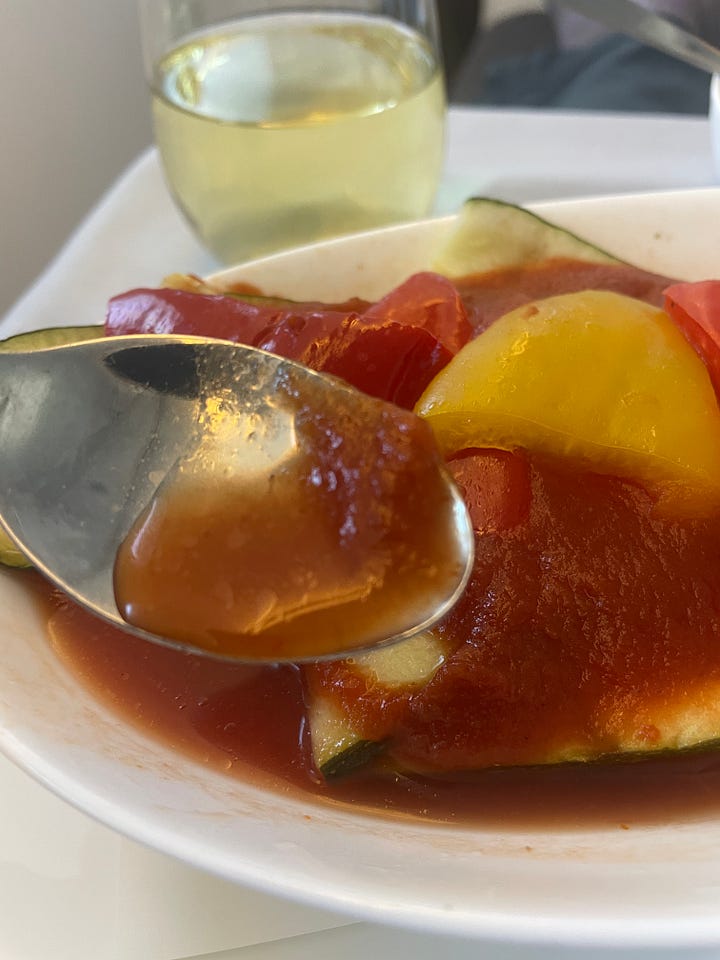
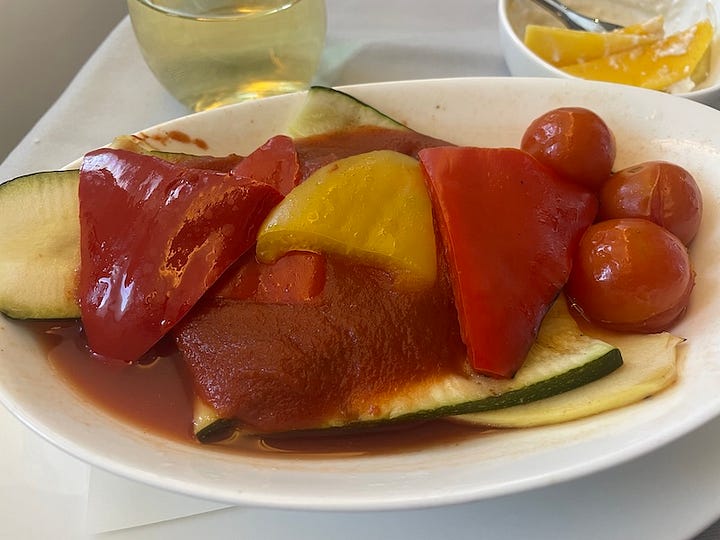
We kvetched: “Who actually makes this and thinks it’s remotely edible? Did they try it? Would they eat it if it were served to them? NO WAY!” She agreed and felt terrible, though it certainly wasn’t her fault.
Meanwhile, meat-, egg-, and dairy-eating passengers were dining on grilled halibut, chicken Wellington, poached king prawns, and braised Herefordshire beef cheek. Not that any of that appeals to me—but clearly, a lot more attention was given to the “regular” passengers.
Why does it feel like I’m being punished for being vegan?
On our way home from Paris on Air France, the meal was surprisingly…decent. I might even say good—mostly thanks to the starter: a parsley-packed, onion-rich grain salad made with chewy barley, reminiscent of tabbouleh. The dessert—a strawberry tart with coconut cream and fresh berries—was actually delicious. And then of course…baguettes. Because France. But the undercooked brown lentils sitting atop a smear of tomato sauce left a lot to be desired.
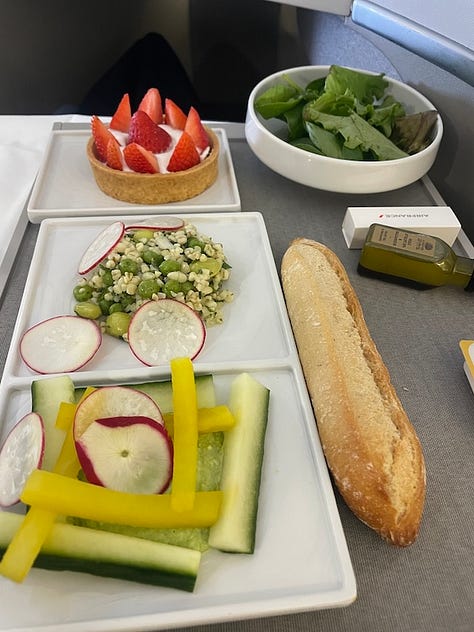
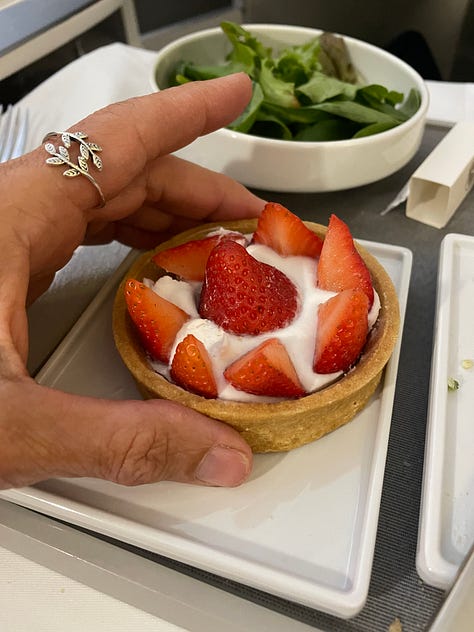
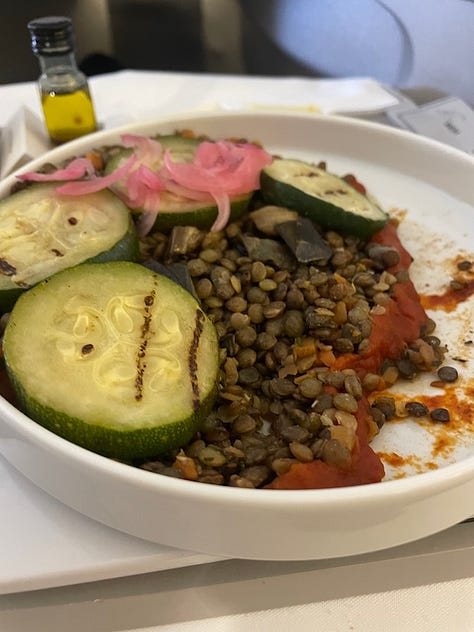
THE PROBLEM AND THE FIX
The quality of an airline meal depends not only on the airline itself, but also on where the flight departs. Not that that’s an excuse. That British Airways flight to France left from San Francisco—yet the meal was revolting. Are there honestly no creative chefs working for BA’s caterer out of SFO?
And there’s the rub. The limitation isn’t the ingredients. Plant-based foods are where the flavor is. Herbs, spices, citrus, aromatics, umami-rich vegetables, grains, legumes, even pickled or fermented elements—they’re the backbone of every great cuisine.
The real limitation is imagination, intention, and effort.
It’s not that plant-based meals can’t be delicious—it’s that too many people don’t bother to make them so. I get it: most chefs are trained to rely on animal fat for richness and flavor. And yes, fat tastes good. But so do plant-based fats. Any chef worth their weight should be able to think outside the box and recognize that what makes food taste good isn’t meat, milk, or eggs—it’s fat, salt, texture, flavor, and familiarity. And all of those things exist in abundance in plant foods.
So when chefs and caterers treat the plant-based meal as an afterthought—or worse, a punishment—it reveals their lack of creativity and openness, not a lack of potential on the part of the plants. And then it becomes a self-fulfilling prophecy: they assume it won’t be good, so they don’t put in the effort—and then serve a dish that confirms their own low expectations. That’s what gives plant-based food a bad name. Not the ingredients, but the lazy, uninspired way they’re used.
So, here’s what I want to say to airlines. (And if it resonates with you, feel free to use this letter—or a version of it—in your own communication and advocacy.)
Open Letter to Airlines
Dear Airline,
I get it—feeding hundreds of people at 35,000 feet isn’t easy. Budgets are tight, logistics are complicated, and there’s no shortage of dietary preferences to accommodate. But here’s the thing: when I’m served a bland plate of uninspired vegetables while the rest of the cabin enjoys thoughtfully prepared meals, it’s hard not to feel like I’m an afterthought. Or a burden. Or a criminal.
The problem isn’t the ingredients. Plant-based food isn’t lacking in flavor or variety. In fact, it’s where the variety and flavor are—herbs, spices, nuts, grains, legumes, vegetables, fruits, aromatics, fermented or pickled foods. These are the building blocks of some of the most beloved cuisines around the world.
The problem is lack of imagination, intention, and effort.
We’re not asking for luxury. We’re asking for parity—the same care and intention you give to meals for your omnivorous passengers. A meal that’s edible, satisfying, and made with the understanding that plant-based travelers are paying customers, too.
I realize not every airline has a chef on board—or a consulting culinary team. You’re hiring catering companies to do this. Fine. Then talk to them. Provide standards. Offer suggestions. Give them clear guidelines—like asking, “Would you eat this?” or “Would you want to be served this?” Make it clear that plant-based meals deserve the same thought and attention as every other option on that tray.
Need ideas? Here are just a few simple, widely appealing options that any decent catering company should be able to pull off:
Cold soba noodles with edamame, scallions, and soy-ginger dressing
Penne with arrabbiata sauce
Moroccan-style couscous with vegetables and spiced chickpeas
Miso-glazed tofu with jasmine rice and sautéed greens
Stuffed peppers with rice or quinoa, pine nuts, and herbs
Rice noodles with vegetables and peanut sauce
Pasta primavera with olive oil and garlic
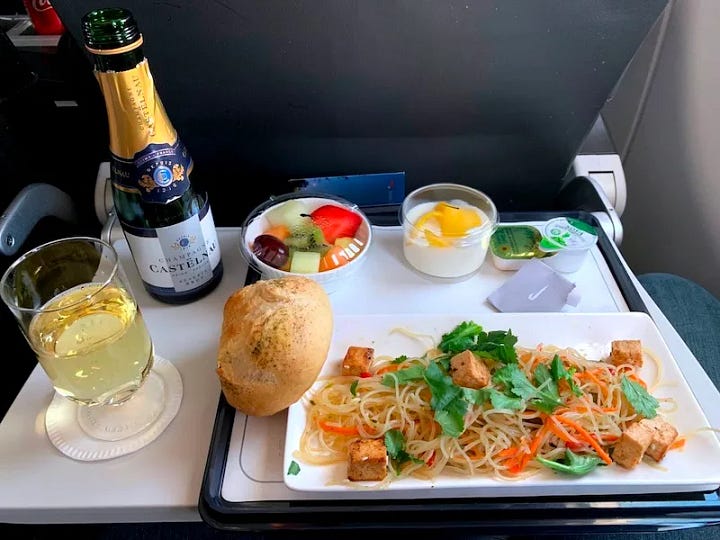
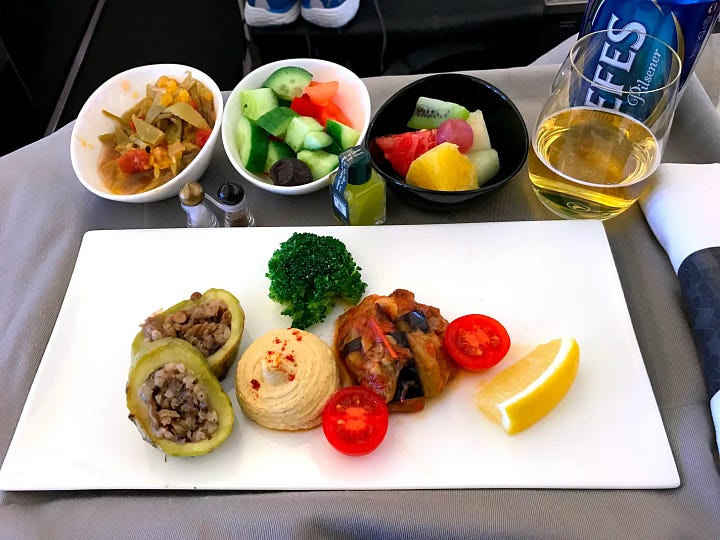
None of this is complicated. These are mainstream dishes that travel well and appeal to a wide range of passengers. If your caterers can’t manage meals like these, they’re not trying—or they’re not very skilled. Talk to them. Ask for better. Or better yet… hire me. I’d be happy to consult.
Please don’t treat plant-based passengers like second-class citizens. We’re not asking for extra. We’re asking for equal.
Sincerely,
A loyal, paying, plant-based passenger
(and someone who just wants to eat something decent on a long-haul flight)
Tell me: What have been some of your best and worst airline food experiences?
My Daily Essentials for Travel and Beyond
Speaking of travel, one thing I never travel without is my packet of vitamins—specifically those made by Complement. I love Complement because, while a plant-based diet provides plenty of vitamins, minerals, and healthy fats (despite persistent myths), it helps cover those few—but essential—nutrients that can be harder to get. I take Complement Essential as my daily multivitamin for B12, D3, iodine, zinc, and magnesium; Omega Complex for essential fats; and as part of my strength-training and muscle-building routine, I fuel up with their clean, unsweetened Unflavored Organic Protein. Also, I'm excited about their new product, Restore—perfect for managing jet lag. It’s more than just a sleep aid; it’s a nightly reset with calming adaptogens, inflammation support, and nutrients that help your body truly recover and recharge.With Complement and my nutrient-rich diet, I have everything I need to fuel my body, support my strength, and thrive so I can do my work in the world for animals — both human and non-human.
Give them a try and get 15% off everything you order, every time you order, using THIS LINK and the code: JOYFULVEGAN.
(Don’t forget to use JOYFULVEGAN as the coupon code to get 15% off every time!)
Ethical All-Inclusive Vegan Trips
👉 Travel with me! I host animal-friendly, luxury, all-inclusive vegan trips around the world, specifically curated to ensure high-quality, high-touch premium experiences. Check out our upcoming trips, and let me know if you have any questions.
👉 Read more travel tips! The Joyful Vegan Travel Series is a Substack-exclusive collection of tips, stories, and reflections from our adventures around the world. As a subscriber, you’ll receive:
My favorite plant-based dishes and restaurants
Hidden gems and meaningful cultural experiences
Tips for avoiding animal cruelty while traveling
Sneak peeks, stories, and real-time updates






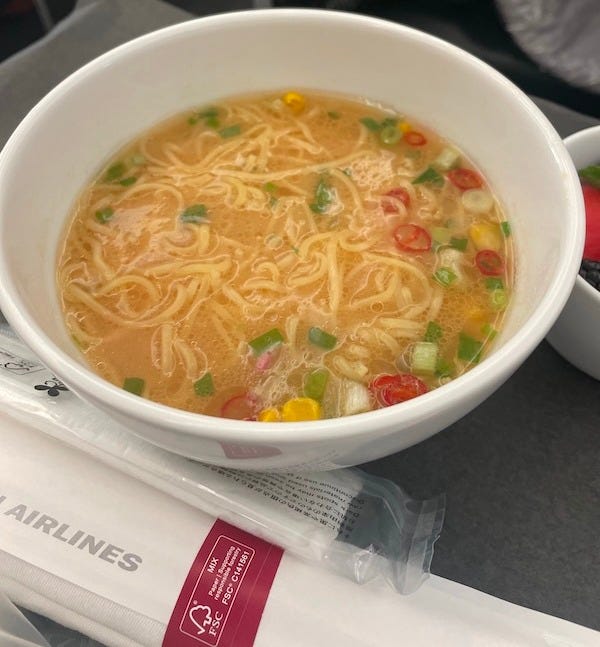
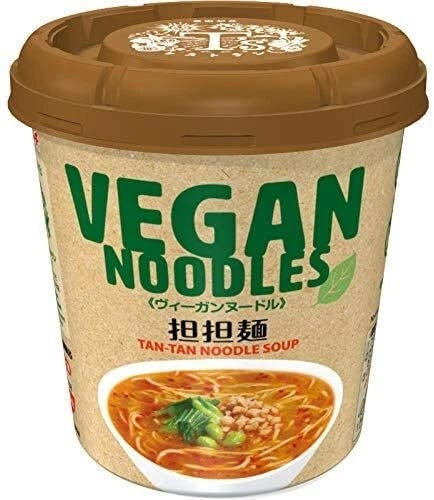
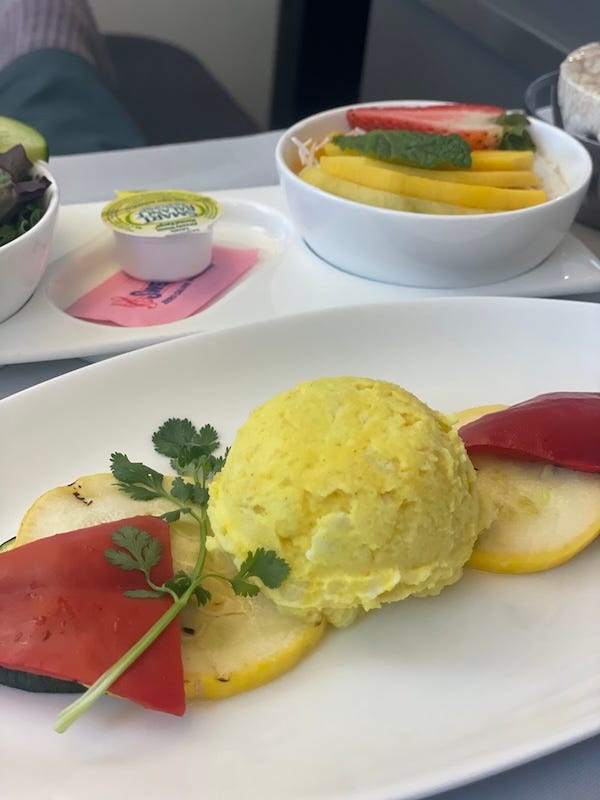
So true. I fly out of Miami and all the airlines use Sky Chefs as their supplier and their vegan meals are notoriously terrible. I usually have a much better experience on my return, coming out of a different part of the world that has much more creative chefs.
So important. Often they'll give me a vegetarian meal and say it's vegan.